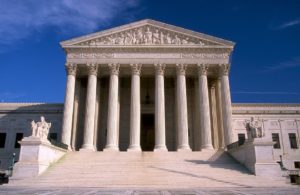SCOTUS 2018 Roundup and 2019 Preview
September 12, 2018
 The Supreme Court of the United States (SCOTUS) heard several cases with employment implications during their 2018 session, including the following four cases. (Click the case names to read more about these cases.)
The Supreme Court of the United States (SCOTUS) heard several cases with employment implications during their 2018 session, including the following four cases. (Click the case names to read more about these cases.)
- Encino Motorcars, LLC v. Navarro: Encino shifted the burden of proof in Fair Labor Standards Act (FLSA) overtime exemption cases to the plaintiff, meaning that if employees cannot prove they were misclassified, they will not be entitled to overtime pay.
- Epic Systems Corp. v. Lewis: Epic held that employers may enforce class action waivers in arbitration agreements rather than being obligated to allow employees to unite in a class action suit.
- Masterpiece Cakeshop, Ltd. V. Colorado Civil Rights Commission: Masterpiece argued the key civil rights issues of discrimination versus freedom of religion. Although both sides declared a win, the court simply decided that the law is the law and employers cannot deny equal access to goods and services but also religion remains a highly-protected civil right.
- Janus v. American Federation of State, County, and Municipal Employees: Janus ruled that public sector employees are not required to pay fees to a union they choose not to join, even if they receive the benefits of the union’s negotiations.
What’s Coming Up?
With Brett Kavanaugh’s potential confirmation as the new SCOTUS justice due to Justice Kennedy’s retirement, SCOTUS will likely continue on the conservative trend. The EEOC is speculating that cases potentially on the docket for the Supreme Court next season may be related to age discrimination, equal pay, sexual orientation, and gender identity, including possible appeals of these circuit court decisions:- Rizo v. Yovino: The Ninth Circuit Court of Appeals held that under the federal Equal Pay Act an employer cannot justify a wage differential between male and female employees by relying on prior salary.
- EEOC v. R.G. & G.R. Harris Funeral Homes: The Sixth Circuit Court of Appeals ruled that employers may not discriminate against employees because of failure to conform to sex stereotypes, transgender, or transitioning status.
- Kleber v. CareFusion Corporation: The Seventh Circuit Court of Appeals found that an outside job applicant can assert a disparate impact claim under the federal Age Discrimination in Employment Act. (Disparate impact refers to employment practices that appear to be nondiscriminatory but adversely affect one group of protected class individuals more than others.)
- Zarda v. Altitude Express, Inc.: The Second Circuit Court of Appeals ruled that Title VII protects employees from discrimination based on sexual orientation.
